Most parents find it extremely frustrating to put their children to sleep. Toddlers are so bubbly and energetic; the moment they get up, they are ready to go.
This is why most parents dread having to interrupt their baby’s sleep, even for a diaper change.
You know exactly what to do in the daytime if your toddler poops their diaper. Without flinching, you grab them for a diaper change.
At night, however, it’s a different ballgame. You have to weigh your options carefully and decide what you want to prioritize your child’s sleep or comfort. Too many diaper changes could result in sleep disturbances becoming commonplace.
This post discusses why your baby poops in their sleep and 5 ways you can help reduce the times when it happens.
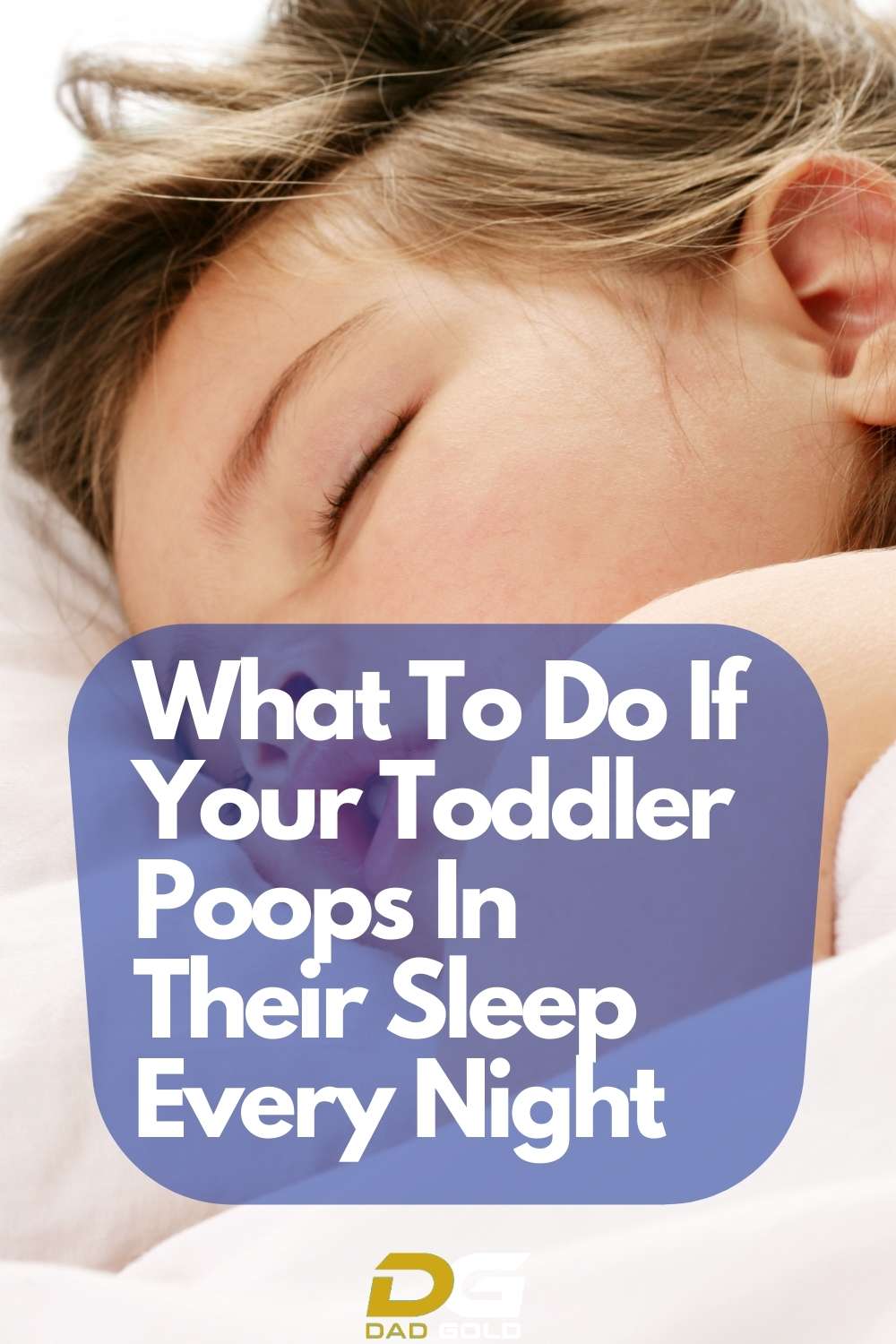
Should you change a poopy diaper when sleeping?
Waking your sleeping baby can be a very painful decision, especially if you struggle with putting him to sleep.
It might seem like a great idea to let your baby catch some sleep and not bother waking him up for a diaper change. However, this may not be a wise decision, especially if you are certain a poop accident might have occurred.
The acid content of your toddlers’ poop can result in skin irritations or an infection in more severe cases. While applying a diaper rash cream can help combat irritation by creating a barrier between your child’s skin and the soiled diaper, you should never let your baby sleep in his poop.
-

Bold Male Pride – Baseball Trucker Cap Celebrating Masculinity
£18.00 Select options This product has multiple variants. The options may be chosen on the product page -

Dad Bod Appreciation Gift Mug
£14.00 Add to cart -

Dad Bod, Bad Jokes Structured Baseball Cap
£22.00 Select options This product has multiple variants. The options may be chosen on the product page
The fussing and crying that comes with a baby being woken up from sleep is nothing compared to the discomfort and pains of a bad rash.
Tip – When changing your baby’s diapers at night, make it as snappy as you can. Keep all the supplies you need close to the bed to make things easier for you. Also, do not sing to or play with your baby, and try not to look into his eyes because it can create an interaction, excite him and make it difficult to put him back to sleep.
Use dim lights while changing, turn off the lights once done, and put your child back to sleep.
Why do toddlers poop in their sleep?
So let’s be honest! Every single one of us was potty trained.
Humans are not born with the mind-body relationship that lets them know when to go poop. It’s only natural for your baby to poop in their sleep.
Toddlers are still in their growth phase and in the process of becoming potty trained too.
Initially, they’d tend to develop more control over their bowels when awake and alert than asleep. And as time goes on, they will learn to wake up to poop and go back to sleep.
Eating late at night, consuming certain solids and liquids just before nap time is a major cause of a toddler pooping while asleep.
Another possible reason your baby poops in his sleep is a sickness, usually in the digestive system. You should consult your doctor for a proper diagnosis if you suspect that your baby might be experiencing severe stomach pains.
How to stop a toddler pooping in their sleep
Tip 1: Feed your toddler their final meal earlier than you usually would
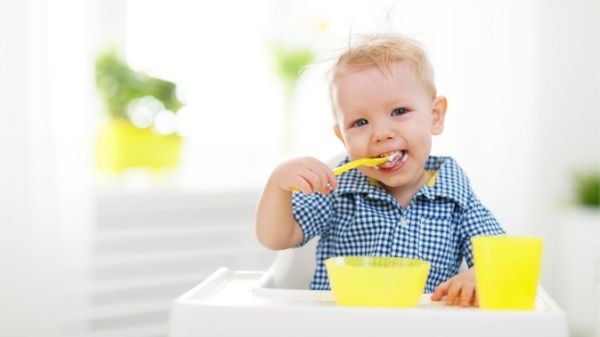
When you feed your toddler dinner earlier, his body will have enough time to digest the food and allow him to poop before he falls asleep.
Never put your toddler to sleep immediately after feeding time; it will only lead them to poop during their nap time. Instead, encourage playful activity to boost their metabolism and help their bowel movements.
Also, pay attention to your toddler’s diet. Notice the foods that cause him to poop more than others and fix those foods for breakfast instead of dinner. For example, a high-fiber meal should only be fed to your toddler as breakfast since it encourages bowel movements and relieves constipation.
If you are still breastfeeding, take note of foods you eat that lead to poop accidents right after. Once you notice a pattern, keep away from such foods before breastfeeding and observe again to confirm your suspicions.
Tip 2: No liquids before bedtime
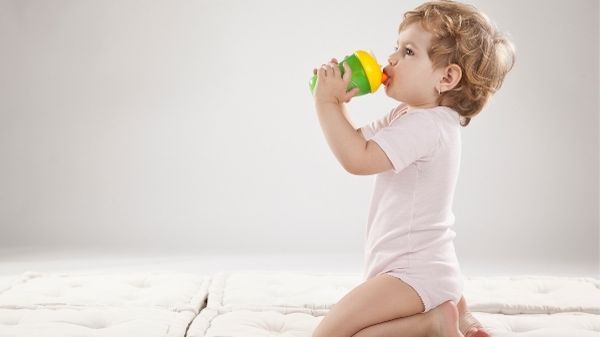
From apple juice to dairy to water, you should meet your toddler’s request for a drink before nap time with a consideration as to whether or not they need to drink.
Liquids help to ease pooping. Sugary drinks like juice or milk can even trigger foul-smelling pooping accidents throughout the night.
You should feed liquids to your toddler an hour to 45 minutes before putting them to sleep; this is an adequate time window for potty trips.
Tip 3: Include a potty trip in your toddler’s bedtime routine
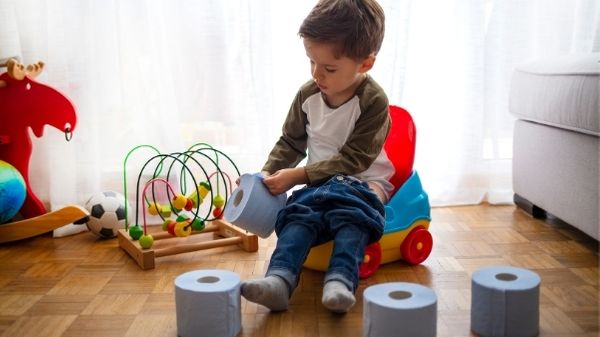
You and your baby will have a sound and peaceful sleep if he goes to bed with empty bowels. You can make this happen by placing him on the potty to poop even if he doesn’t feel like it.
Try not to force your baby or make it a negative experience for him; You can implement a reward system to enforce the potty training. Soon, your baby will be potty trained and will use the potty every night before nap time.
Then your toddler might start sleeping more!
Tip 4: Go commando
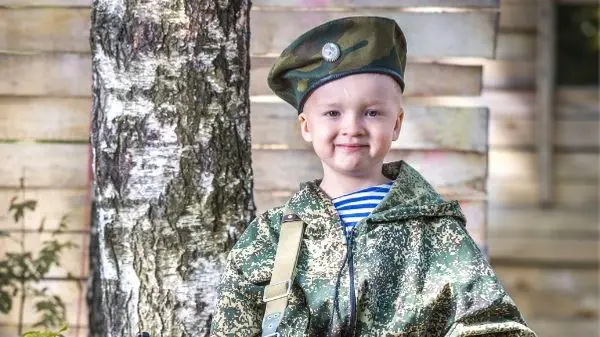
Your child probably poops herself because she knows the diaper or other protective clothing will be there to catch it. If your baby begins to get too comfortable pooping themselves because they know you’d be right there to clean their mess up, you can Go Commando.
Remove your toddler’s diaper and let them move around without it; Toddlers hate the discomfort of soiling themselves, so when there is nothing to help poop things together, they’ll learn to control themselves.
This method can work hand-in-hand with potty training, except that you can replace normal diapers with pull-ups (so your baby can pull their underwear up and down themselves). However, the only disadvantage is that your baby will start pooping in pull-ups before he learns to use his potty.
Tip 5: Put a potty in your toddlers’ room
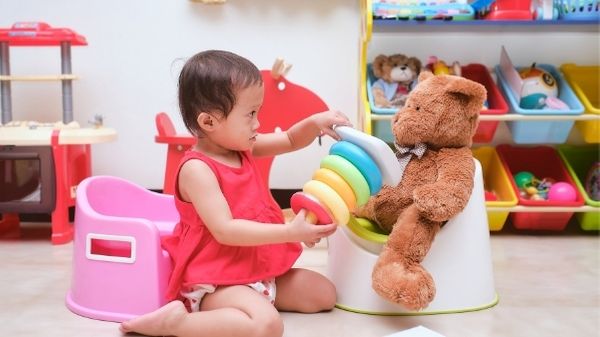
If you place a potty in your toddler’s room where they can see and easily reach it, they will wake up to use it when they need to poop.
This method can work hand in hand with the Go Commando method and helps to support potty training.
Why does my toddler toss and turn so much at night?
It’s normal for your toddler to move around while asleep, especially if they have had a very active day. However, if you notice that your child is tossing and turning so much in their sleep, night after night, you might want to look into it.
Restless sleep can result in overtiredness because your child would wake up feeling exhausted and cranky instead of refreshed and energized.
There are several reasons why your child could be restless at night. Some of them are:
Obstructive sleep apnea
Sleep apnea is when the throat muscles become too relaxed during sleep, causing a momentary obstruction between breaths. Though it is not very common in toddlers, it can be a reason for your child’s tossing and turning.
Sleep apnea symptoms include night sweats, restlessness during sleep, mouth breathing, loud snoring or noisy breathing, bet-wetting, and overtiredness. Please reach out to your pediatrician if you observe any of these symptoms.
Why do toddlers cry when they wake up? Sleep apnea could be a valid reason.
Overactivity during the day
Toddlers are incredibly energetic during the day and spend most of their time exploring. This can factor in how they sleep at night.
Sometimes, they’d even talk in their sleep, recounting the day’s experiences and move around as they do so. To check this, limit screen time and other activities at least an hour before bed.
Teething
Growing teeth is tough on toddlers. They get very uncomfortable and sick because of their itchy gums and high fever.
The pain they feel during the day can be eased using teether toys. However, they’d have to brave the discomfort and go to bed at night. This can lead to them being restless in their sleep.
You can consult with your pediatrician on safe painkillers for your teething toddler to help ease their pain.
Dirty diaper
While some children can sleep soundly through a soiled poopy diaper, others cannot.
If you notice your toddler tugging at their diaper or reaching into his diaper to itch his butt, he probably needs a diaper change.
Conclusion
Growing children never know what to expect, and you cannot be completely prepared. No two babies are alike, so you have to patiently figure out what works for your child and continue implementing it.
Nobody said bringing up a toddler was going to be easy!
And, if you notice anything odd that makes you uncomfortable, do not hesitate to consult with your pediatrician.
Good luck!




